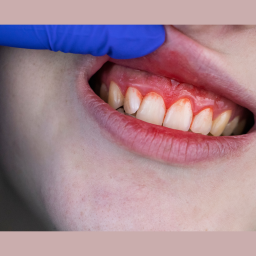Gum disease, also known as periodontal disease, is a common oral health condition that affects the gums and the surrounding tissues that support the teeth. This condition is caused by the buildup of plaque and tartar on the teeth and can lead to a range of problems, from bad breath to tooth loss. In this blog, we’ll explore the causes and symptoms of gum disease, as well as strategies for preventing and treating it.
Understanding Gum Disease
Gum disease can range from mild to severe, with symptoms that include red, swollen, and bleeding gums, as well as bad breath, tooth sensitivity, and toothaches. In its early stages, gum disease is known as gingivitis, which is a mild form of gum inflammation that can often be reversed with proper oral hygiene. However, if left untreated, gingivitis can progress to periodontitis, a more severe form of gum disease that can lead to the loss of teeth and bone in the jaw.
Causes of Gum Disease
The primary cause of gum disease is the buildup of plaque and tartar on the teeth. Plaque is a sticky film that forms on the teeth when bacteria in the mouth combine with food particles and saliva. If plaque is not removed through regular brushing and flossing, it can harden into tartar, which can only be removed by the best dental health professional.
Other factors that can increase the risk of developing gum disease include smoking, hormonal changes, certain medications, and certain medical conditions, such as diabetes.
Preventing Gum Disease
Preventing gum disease starts with good oral hygiene habits. This includes brushing your teeth twice a day with fluoride toothpaste, flossing at least once a day, and using an antiseptic mouthwash. It’s also important to schedule regular check-ups with your oral health professional, who can assess the health of your gums and teeth and provide treatment if necessary.
If you have diabetes problems, it’s especially important to take steps to prevent gum disease, as diabetes can increase the risk of developing this condition. This includes maintaining good blood sugar control, quitting smoking, and following a healthy diet.
Treating Gum Disease
If you develop gum disease, there are several treatment options available, depending on the severity of the condition. In its early stages, gingivitis can often be treated with professional cleaning and improved oral hygiene habits. However, if the disease has progressed to periodontitis, more intensive treatment may be necessary, such as scaling and root planing or gum surgery.
In addition to professional treatment, there are steps you can take at home to help manage gum disease, such as using a soft-bristled toothbrush and avoiding tobacco products.
Gum disease is a common oral health condition that can lead to a range of problems if left untreated. However, by taking steps to prevent and treat this condition, you can maintain healthy gums and teeth and reduce the risk of tooth loss and other complications. If you are experiencing symptoms of gum disease, such as bleeding gums or bad breath, it’s important to schedule an appointment with your oral health professional to receive an accurate diagnosis and appropriate treatment. Book an appointment with Dr. Bharti Tomar for the best treatment related to all dental issues.

